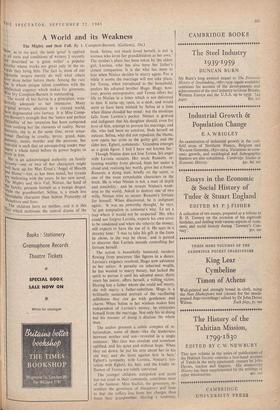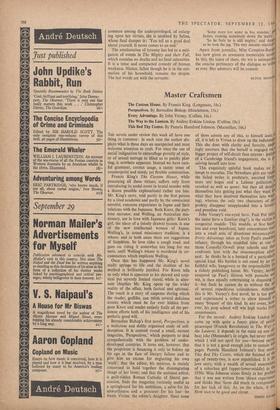A World and its Weakness
The Mighty and their Fall. By I. Compton-Burnett. (Gollancz, 16s.)
, °w, as in the past, the term 'great' is applied 1° all sorts and conditions of writers. I recently SaW described as 'a great writer' a popular novelist whose works are great only in the re- ,wards they bring him. The fact is, most of our reputable writers merely do well what others ,have done better before them. Among the rare few in whom unique talent combines with the Intellectual cogency which makes for greatness, Miss Ivy Compton-Burnett is outstanding. The world of her fiction is a protoplast, won- derfully adequate to her intentions. Many i,°riginal writers, absolute in a created world, ,have degenerated into fantasy. It is Miss Comp- iii°n-Burnett's strength that the 'entire and perfect front of her invention has been composed Irom nothing but the elements of reality. Never fantastic, she is, at the same time, never sensa- tional. Dealing in cruelty, terror, greed, hate, jealousy, incest, murder and the passions, her restraint is such that an unsuspecting reader may ingest a whole novel before its power begins to Work in him.
She is an acknowledged authority on family 1YrannY—one or two of her characters might well have sat for Max Ernst's 'Angel of Hearth and Horne'—but, as has been noted, her tyrants a,,re mellowing with the years. In her new novel, Mighty and their Fall, Ninian, the head of the family, presents himself as a benign despot, ,while the grandmother, Selina, is a much less iirtnidable character than Sabine Ponsonby of Daughters and Sons. l.he children have no mother, and it is this fact which motivates the central drama of the
book. Selina, not much loved herself, is not 'a woman who loves her grandchildren as her own.' The mother's place has been taken by the eldest girl, Lavinia, who has also been her father's closest companion. It is she who has most to lose when Ninian decides to marry again. For a while it seems the marriage will not take place, for Teresa, when introduced to the household, prefers his adopted brother Hugo. Hugo, how- ever, proves unresponsive, and Teresa offers her life to Ninian in a letter which is not delivered to him. It turns up, open, in a desk, and would seem to have been mislaid by Selina at a time when illness clouded her mind : but the envelope falls from Lavinia's pocket. Ninian is grieved and indignant that his daughter should, even for love of him, attempt to prevent his marriage, and she, who had been an autocrat, finds herself an outcast. Selina, whO did not repudiate the blame, now opens her arms to the guilty girl, and the elder boy, Egbert, comments: 'Grandma emerges as a great figure. I feel I have not known her.'
Though Ninian does not lose Teresa, hit anger with Lavinia remains. Her uncle Ransom, re- turning wealthy from abroad, finds her under a cloud and, realising her worth, gives her a home. Ransom, a dying man, briefly on the scene, is one of the most remarkable characters in the book. He is what Ninian is not, a man of depth and sensibility : and he reveals Ninian's weak- ness to the world. Asked to destroy one of two wills, Ninian tries to secure Ransom's fortune for himself. When discovered, he is indignant again: 'It was an unworthy thought,' he says, `to put temptation in someone's way. To set a trap where it would not be suspected.' He, who could not forgive Lavinia, expects his own error to be condoned and when she inherits the money, still expects to have the use of it. He says in a dreamy tone: 'I was to take his gift in the form he chose, in the way he chose,' and is pained to discover that Lavinia intends controlling her fortune herself.
The action is beautifully balanced, incident flowing from precursor like figures in a dance. Lavinia's exigency resolved, Hugo now advances as her suitor. A parasite on inherited wealth, he has wanted to marry money, but lacked the spirit to pursue it until his adopted niece, thirty years his junior, offers herself, a willing, victim. Having lost a father whom she could not marry, she will marry a father-substitute. Hugo is a brilliantly sustained portrait of the vacillating selfishness that can go with gentleness and charm. When Selina in her wisdom makes him independent of Lavinia's money, he extricates himself from the marriage. Not only his so doing but his manner of doing it disclose the whole man.
The author presents a subtle complex of re- lationships, some of them—like the tenderness between mother and son—revealed in a single sentence: 'Her face was resolute and somehow uplifted, and his quiet and without hope. When they sat down, he put his arm about her in his old way, and she leant against him in hers.' Egbcrt's sympathy with Lavinia, Ninian's irri- tation with Egbcrt, his heir, and the kindly in- fluence of Teresa are subtly conveyed.
The younger children, outspoken and acute but not cruel in their comments, contribute most of the humour. Miss Starkie, the governess, re- sembles the governess of Daughters and Sons in that she suffers less from her charges than from their grandmother. Having a tendency,
common among the underprivileged, of enlarg- ing upon her virtues, she is snubbed by Selina, whose final damper is: 'You tell us a good deal about yourself. It never comes to an end.'
The amelioration of tyranny has led to a miti- gation of events in The Mighty and their Fall, which contains no deaths and no fatal calamities. It is a tense and compacted comedy of human weakness. Ninian, fallen though he is in the esti- mation of his household, remains the despot. fhe last words are with the servants: 'Some more hot water in live minutes,' 55' James, running noiselessly down the stairs. 'So he feels he is still mighty,' said Ainger, as he took the jug. 'The very minutes stipulated' Apart from juvenilia, Miss Compton-Burnett has now given us seventeen memorable novels, In this, the latest of them, the wit is unimpaired the concise pertinency of the dialogue as telliel as ever. Her admirers will be content.
OLIVIA MANNIN6











































 Previous page
Previous page